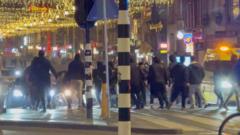In Amsterdam, clashes erupted in the city center, leading to 57 arrests amid significant unrest involving young locals and Israeli football supporters, particularly those associated with Maccabi Tel Aviv, who were in town for a Europa Cup match against Ajax. The precise participants in the violence remain murky, with witnesses reporting that individuals were dressed in dark clothing.
Dutch Prime Minister Dick Schoof publicly condemned what he termed “antisemitic attacks,” expressing horror over the incidents and confirming communication with Israeli Prime Minister Benjamin Netanyahu. Netanyahu indicated that Israel was dispatching "two rescue planes" to assist citizens in Amsterdam, describing the disturbances as "severe and violent incidents against Israelis," a description echoed by Israeli President Isaac Herzog, who labeled the events as a "pogrom."
The clashes unfolded predominantly around Dam Square, a key area in Amsterdam, with trouble intensifying post-match. Reports indicated earlier frictions had occurred between Maccabi supporters and pro-Palestinian protesters, with some fans allegedly igniting fireworks and tearing down a Palestinian flag. The escalation after the match was underscored by social media footage displaying acts of violence, raising critical questions about the safety of attendees and bystanders in the city.
Dutch authorities faced scrutiny regarding the handling of these events, with critical voices arising from the political spectrum, including Geert Wilders, a prominent anti-Islam politician. Wilders insisted that the government should be held accountable for failing to ensure the safety of Israeli citizens. In an effort to manage tensions, Amsterdam Mayor Femke Halsema had attempted to relocate pro-Palestinian protesters away from potential conflict zones near the Johan Cruyff Arena, but reports indicate that some groups sought to breach police cordons.
In light of these events, Herzog expressed confidence in the Dutch authorities' capacity to protect and locate all individuals under threat. However, the incident has raised broader discussions on community safety, civil order, and the ramifications of political tensions manifesting in public unrest.


















